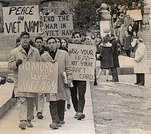
In this lesson, students will continue to read, annotate, write about, and discuss “The Things They Carried.”
- Subject:
- English Language Arts
- Reading Literature
- Material Type:
- Lesson Plan
- Author:
- Sally Hoover
- Date Added:
- 03/04/2019

In this lesson, students will continue to read, annotate, write about, and discuss “The Things They Carried.”
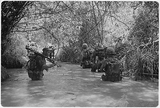
In this lesson, to help students understand the next short story, they will learn about the Vietnam War. Students will watch videos about the Vietnam War, conduct some research, and make a short presentation.

The 12th grade learning experience consists of 7 mostly month-long units aligned to the Common Core State Standards, with available course material for teachers and students easily accessible online. Over the course of the year there is a steady progression in text complexity levels, sophistication of writing tasks, speaking and listening activities, and increased opportunities for independent and collaborative work. Rubrics and student models accompany many writing assignments.Throughout the 12th grade year, in addition to the Common Read texts that the whole class reads together, students each select an Independent Reading book and engage with peers in group Book Talks. Language study is embedded in every 12th grade unit as students use annotation to closely review aspects of each text. Teacher resources provide additional materials to support each unit.

Who decides who among us is civilized? What rules should govern immigration into the United States? Whom should we let in? Keep out? What should we do about political refugees or children without papers? What if they would be a drain on our economy?
ACCOMPLISHMENTS
Students read William Shakespeare’s play The Tempest and write a short argument about who in the play is truly civilized.
Students participate in a mock trial in which they argue for or against granting asylum to a teenage refugee, and then they write arguments in favor of granting asylum to one refugee and against granting it to another.
Students read an Independent Reading text and write an informational essay about a global issue and how that relates to their book.
GUIDING QUESTIONS
These questions are a guide to stimulate thinking, discussion, and writing on the themes and ideas in the unit. For complete and thoughtful answers and for meaningful discussions, students must use evidence based on careful reading of the texts.
What role do national identity, custom, religion, and other locally held beliefs play in a world increasingly characterized by globalization?
How does Shakespeare’s view of human rights compare with that in the Universal Declaration of Human Rights?
Who is civilized? Who decides what civilization is or how it’s defined?
How do we behave toward and acknowledge those whose culture is different from our own?

In this lesson, students will write about how their Independent Reading book addresses the unit’s Guiding Questions, and they’ll share their responses with a partner. Students will begin writing a narrative about a time when they were afraid. They’ll also discuss xenophobia.

What is globalization? In this lesson, students will explore answers to the question by reading information from a website called Globalization 101. They’ll choose one area of interest to explore from this website. Students will plan a presentation to share their findings with the whole class.
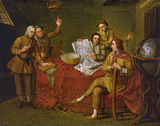
What is the U.S. policy on immigration, especially for refugees? In this lesson, students will share responses on current issues in immigration. Then, as a class, they’ll jigsaw a fact sheet about immigration policy. They’ll get instructions about the Granting Refuge Activity.

How do we behave toward and acknowledge those whose culture is different from our own? In this lesson, students will take a moment to polish their presentations, and then each group will present. Then they’ll write a reflection about the benefits and drawbacks of globalization.

Is immigration reform necessary? In this lesson, students will revise their narratives for sentence variety and proofread them. They’ll read Emma Lazarus’s poem “The New Colossus” and discuss what the poem says about immigrants. They’ll write about current issues regarding immigration.

In this lesson, students will share their drafts of their fear narratives and give feedback in small groups. They’ll have class time to revise and complete a final draft. They’ll revisit the Universal Declaration of Human Rights to see what the document says about immigrants and refugees.

Whom should we let in? In this lesson, the defense, prosecution, and teenager from two cases will make their presentations. The policy board members will decide each case. Those observing will take notes, listing arguments for and against granting asylum.

Whom should we let in? This lesson is a repeat of the last lesson, with the cases of two different teenagers presented. After the class listens to the cases and decisions, you will clarify your students’ argument assignments.
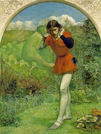
In this lesson, students will be assigned a role for the Granting Refuge Activity. They’ll meet in groups to research, develop strategies, and plan how to argue for granting asylum or denying it.

In this lesson, students will meet with their Granting Refuge Activity groups. Then they’ll meet in one of three groups: teenagers and their defenders, prosecutors, and policy board members. Finally, they’ll go back to their original groups to prepare arguments for the next lesson.
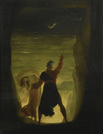
What are the requirements for a written argument? In this lesson, students will draft an essay arguing in favor of granting asylum to one refugee in the Granting Refuge Activity and against granting it to another. They’ll share their writing and get feedback.
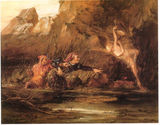
In this lesson, you'll use your detailed outline to write an initial draft of your report. You'll share your writing in triads and receive feedback. Your essay may be chosen for Author's Chair. You'll revise the body of your report and consider ways to embed multimedia elements.In this lesson, students will use their detailed outline to write an initial draft of their report. They’ll share their writing in triads and receive feedback. Their essay may be chosen for Author’s Chair. Students will revise the body of their report and consider ways to embed multimedia elements.

In this lesson, you'll work with a partner to brainstorm ideas for research for your report. You'll review the Informational rubric and write a detailed outline.In this lesson, students will work with a partner to brainstorm ideas for research for their report. They’ll review the Grade 12 Informational Writing Rubric and write a detailed outline.

In this lesson, you'll join a small group to share your report and receive more feedback. Group members will choose one report to be presented in Lesson 28 to the whole class. You'll revise, proofread, and prepare the final draft of your report.In this lesson, students will join small groups to share their reports and receive more feedback. Group members will choose one report to be presented in Lesson 28 to the whole class. Students will revise, proofread, and prepare the final draft of their report.
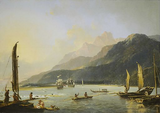
Congratulations on all the writing you have completed in this unit! In this lesson, selected students will present their work. After those presentations, you'll submit your report and write a reflection on what it means to be a civilized citizen.Congratulations on all the writing students have completed in this unit! In this lesson, selected students will present their work. After those presentations, they’ll submit their report and write a reflection on what it means to be a civilized citizen.

In this lesson, you'll see who the class thought should be granted asylum. You'll learn about your next assignment: a report on an issue from your Independent Reading book. You'll choose your issue, submit it to your teacher, and start working.In this lesson, students will see who the class thought should be granted asylum. They’ll learn about their next assignment: a report on an issue from their Independent Reading book. Students will choose their issue, submit it to you, and start working.